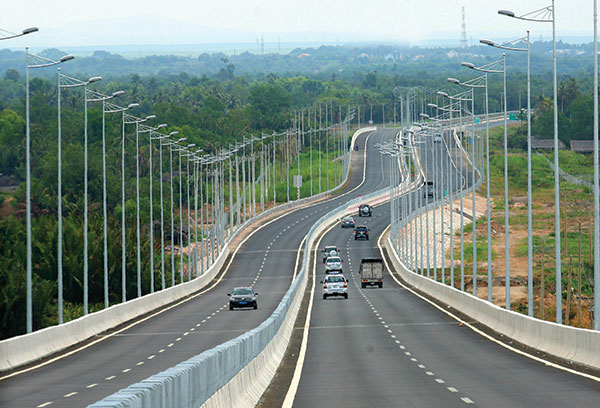Rules on PPPs relax, helping infrastructure
 |
| Further legislation is needed to optimise the effects of PPPs |
Vu Quynh Le, deputy head of the Public Procurement Agency under the Ministry of Planning and Investment (MPI), said the movement aims to settle a number of issues that remain uncertain after two years since the introduction of Decree No.15/2015/ND-CP, which details investment in the form of public-private partnerships (PPPs), and Decree No.30/2015/ND-CP, which guides the implementation of a number of articles on investor selection of the Law on Bidding.
Nguyen Tuan Anh, a representative of the Ministry of Industry and Trade’s General Directorate of Energy, which manages build-operate-transfer (BOT) power projects, claimed that a major concern with regard to power projects is the overlap of existing legal documents.
He explained that Decree 15 allows the contracting parties to agree to the application of foreign laws to regulate the project contracts in which one party is a foreign investor, and the contracts are guaranteed by the government for performance obligation. This is a major change which allows international financial consultants to become more deeply involved in projects.
There are still some uncertainties for investors, though, as the Land Law 2016 stipulates that land use rights and assets attached to land must apply to domestic laws.
Regarding Decree 30, Anh suggested that regulations need to be more relaxed. “It should focus on qualified investors for capital instead of experience,” he said.
Vu Tuan Anh, deputy director of the Ministry of Transport’s PPP Management Department, admitted that, due to a lack of capital, the Vietnamese government should accept revenue guarantees to attract foreign investors and to mobilise foreign loans at reasonable rates.
Experts noted that Decree 15 regulates state capital in the project implementation process, stating that it should be primarily used to support the construction of auxiliary facilities, and cover compensation, site clearance and resettlement. However, the decree does not specify if the value of land use rights have been included in the total investment cost or not.
MPI estimated that until 2020, Vietnam would need around $170 billion to develop its infrastructure, including transportation, bridges, power plants, water supply networks, waste treatment plants, and ports. However, traditional, public sources of capital, including the state budget, government bonds, and official development assistance would struggle meet more than half of this sum. Ergo, PPPs could prove to be a timely opportunity for both the government and the economy of Vietnam.
Vietnam has been implementing PPP models for years through BOT and build-transfer (BT) investments, and the government managed these kinds of investment through Decision No.71/2010/QD-TTg – which guides the implementation of pilot PPP projects – and Decree No.108/2006/ND-CP – which guides the implementation of infrastructure projects under BOT, build-transfer-operate (BTO), and BT contracts.
Decree 15 expands on the number of PPP forms available, laying the legal foundation for contracts of BOT; BTO; BT; build-operate-own (BOO); build-transfer-lease (BTL); build-lease-transfer (BLT); and operate-manage (O&M) models.
What the stars mean:
★ Poor ★ ★ Promising ★★★ Good ★★★★ Very good ★★★★★ Exceptional
Latest News
More News
- Hermes joins Long Thanh cargo terminal development (February 04, 2026 | 15:59)
- SCG enhances production and distribution in Vietnam (February 04, 2026 | 08:00)
- UNIVACCO strengthens Asia expansion with Vietnam facility (February 03, 2026 | 08:00)
- Cai Mep Ha Port project wins approval with $1.95bn investment (February 02, 2026 | 16:17)
- Repositioning Vietnam in Asia’s manufacturing race (February 02, 2026 | 16:00)
- Manufacturing growth remains solid in early 2026 (February 02, 2026 | 15:28)
- Navigating venture capital trends across the continent (February 02, 2026 | 14:00)
- Motivations to achieve high growth (February 02, 2026 | 11:00)
- Capacity and regulations among British areas of expertise in IFCs (February 02, 2026 | 09:09)
- Transition underway in German investment across Vietnam (February 02, 2026 | 08:00)
















 Mobile Version
Mobile Version